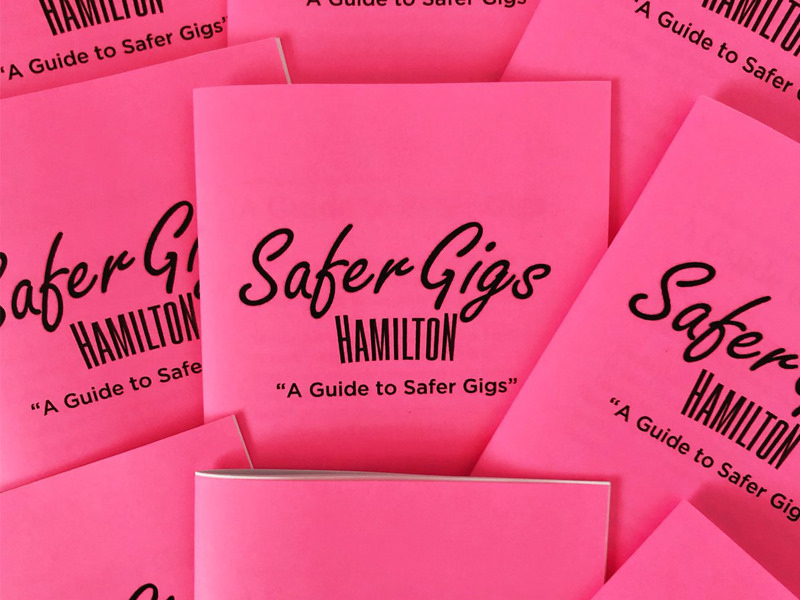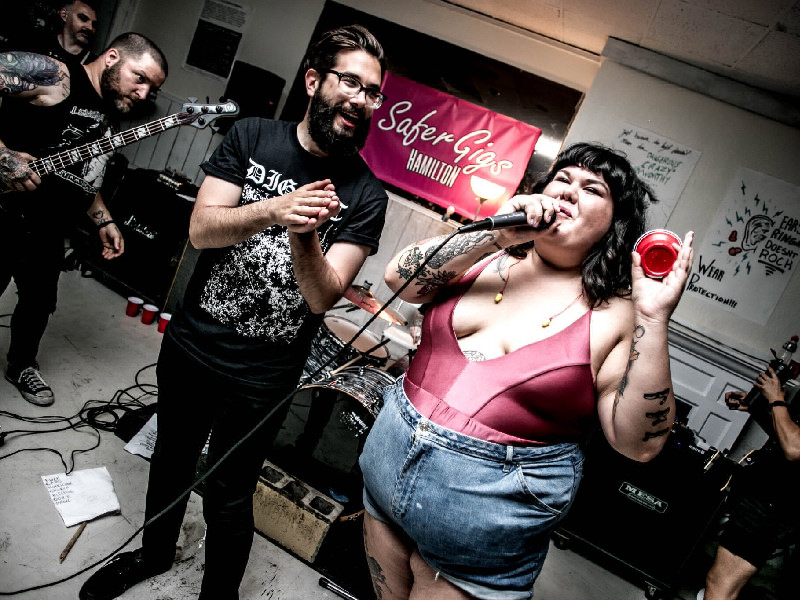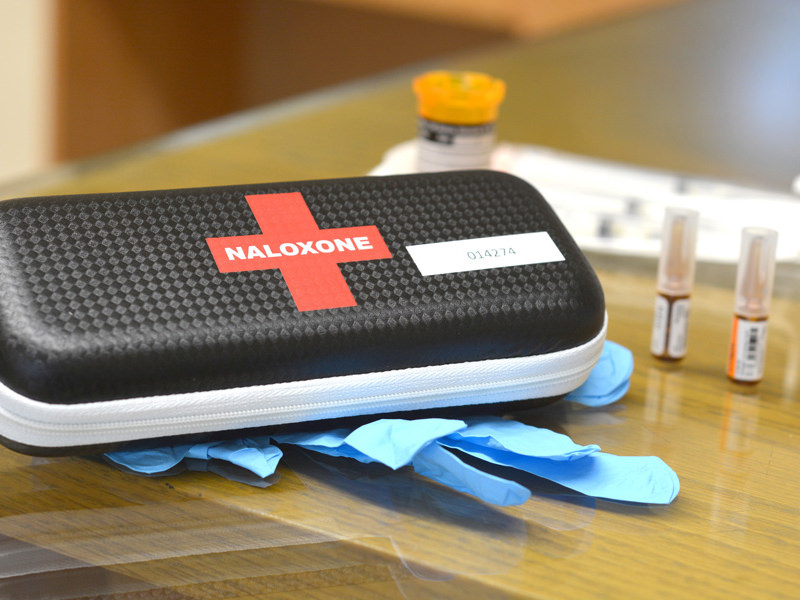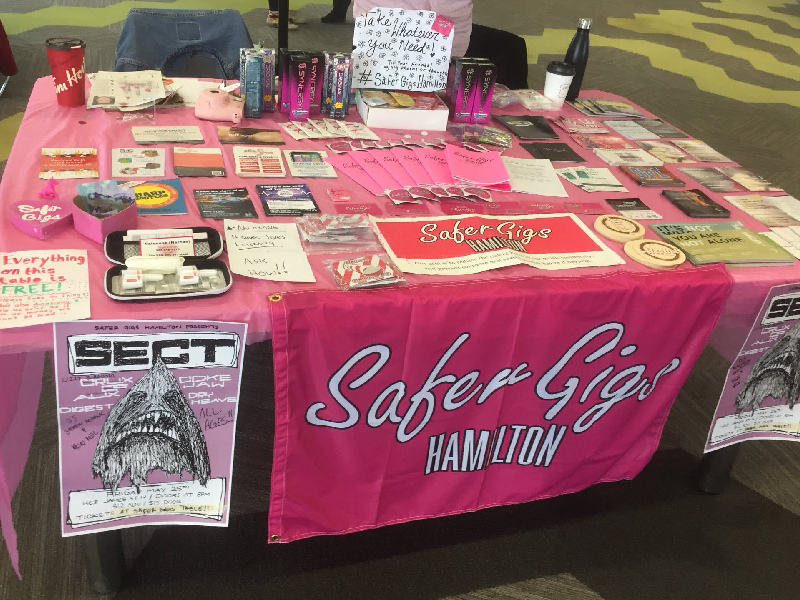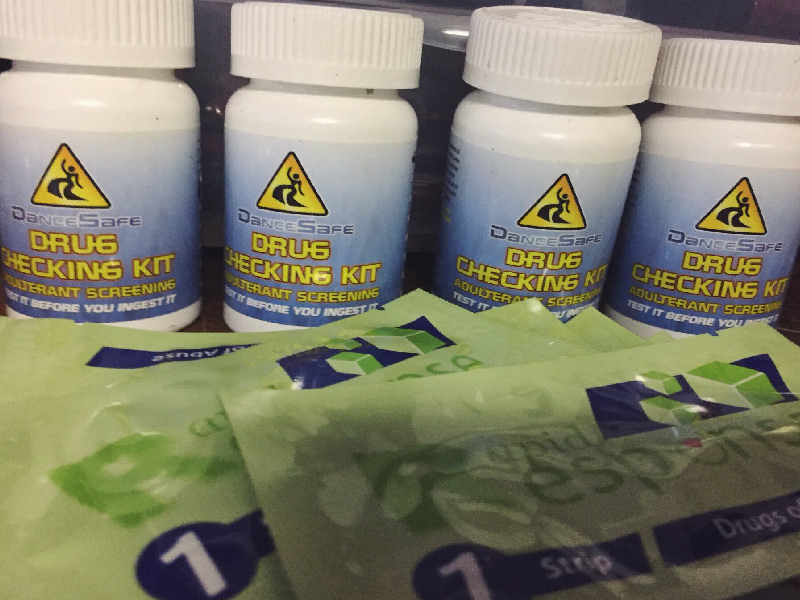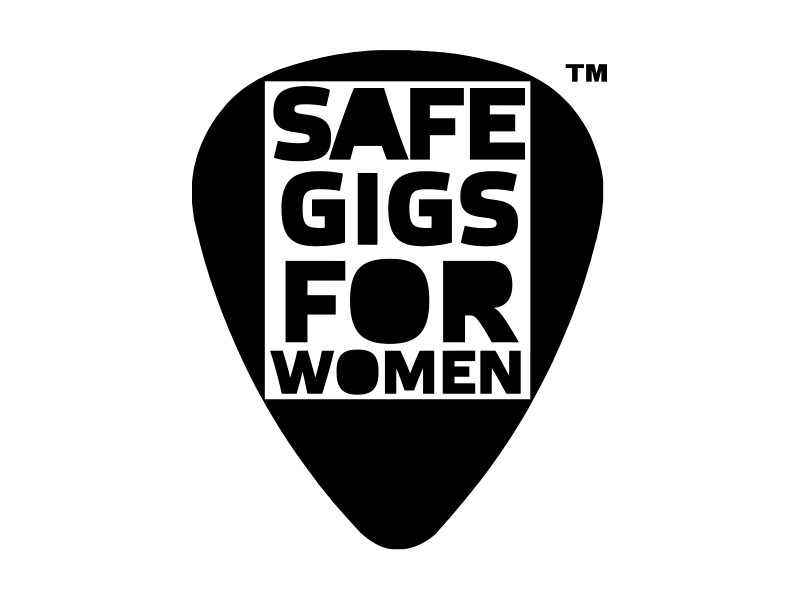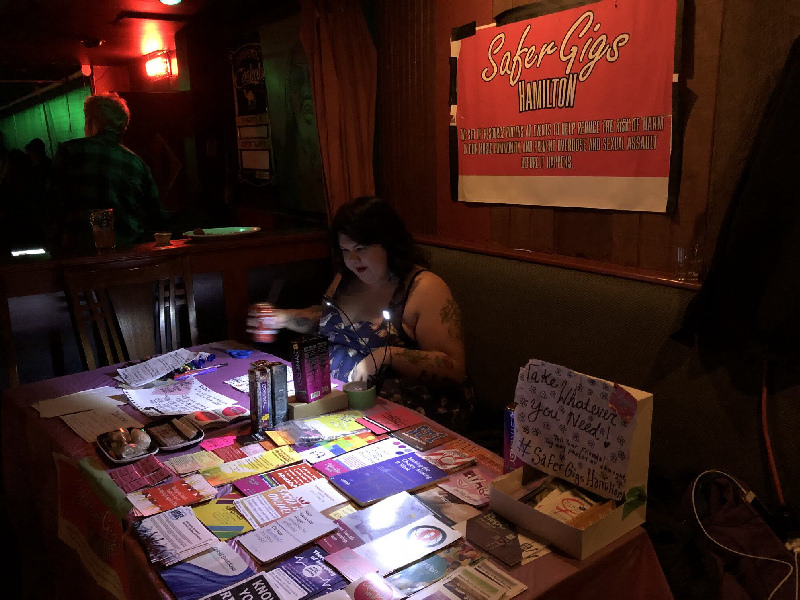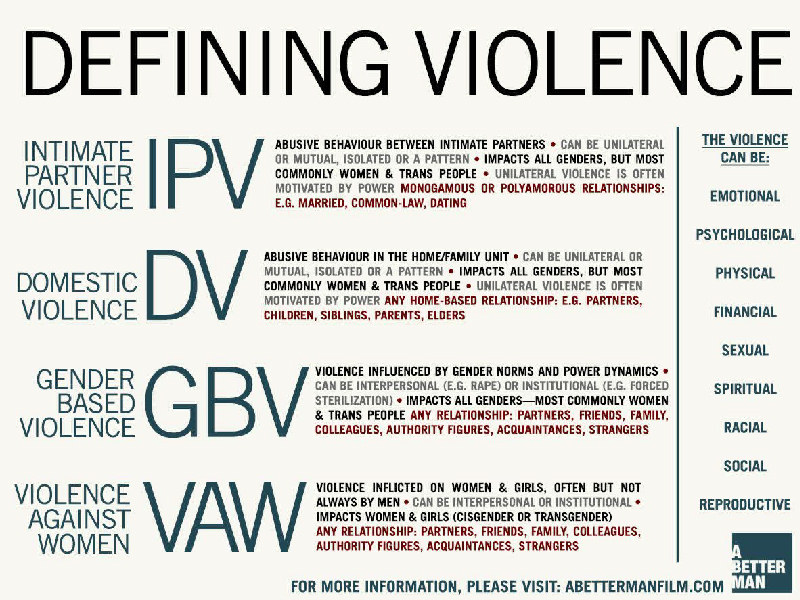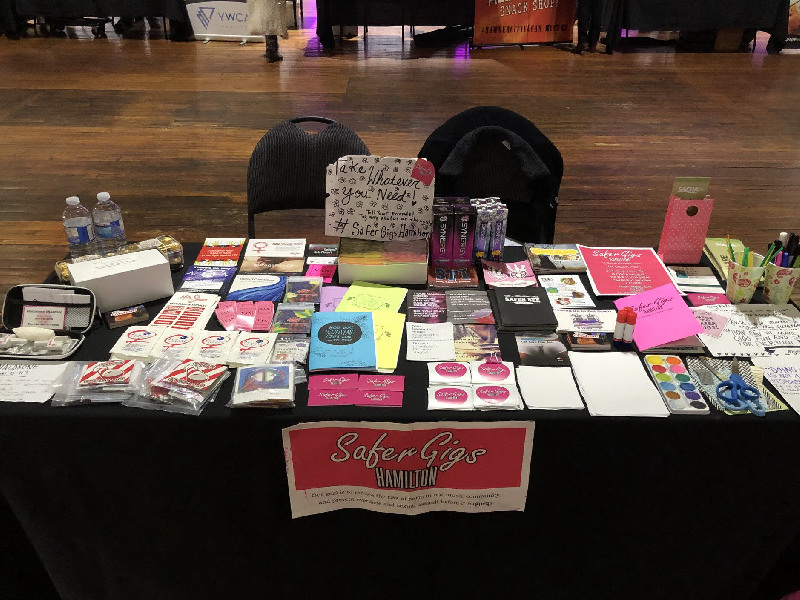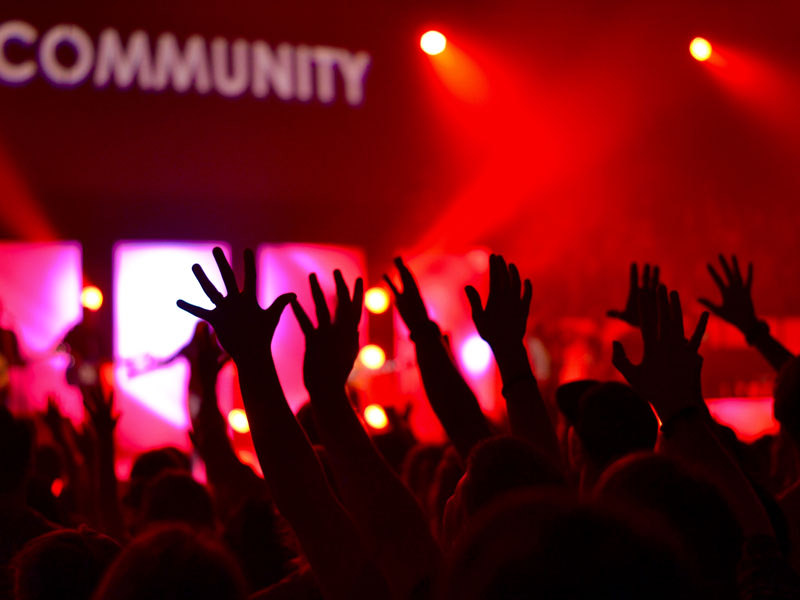|
By Danny Sheahan Transcribed by Tashia Antoine It is quite common to hear of incidents such as sexual assault, overdoses or other harmful situations occurring at a live show or concert. One community organization has come forward to ensure the city’s music scene is safer for all music fans by providing education and life-saving resources for those in attendance. In this interview Northern Touch interview with VIBE Correspondent Danny Sheahan, we discuss Safer Gigs Hamilton, a project founded by Jessie Goyette and Vince Soliveri aimed at maintaining safer spaces within Hamilton’s music scene. We also discuss the need for the overall community to get involved and become proactive in making sure everyone can enjoy music in a positive and safe environment. Danny: Jessie, could you give us a brief description of what Safer Gigs Hamilton is? Jessie: Safer Gigs Hamilton is a volunteer run organization. We go to shows, events, art spaces, and we try to promote safety and inclusivity in every form. We set up these tables at shows and we promote things like bystander intervention techniques. And the various ways that we could help out or encourage other people to help when it comes to things like preventing sexual assault or preventing overdoses or just knowing what do to in the event of a crisis. We also provide resources in the form of pamphlets, and also things like sexual health supply. We also always have a naloxone kit on us, and try to educate on what that is too. Danny: Vince, tell us about the origins of Safer Gigs Hamilton and how did it become organized in the first place? Vince: The idea for Safer Gigs Hamilton came a couple years ago when I was on tour with a band, and we were performing in Charlottetown, P.E.I. For anybody who has never been to P.E.I. they have a fantastic punk and hardcore community, that is completely D.I.Y, but with that, they are huge advocates of creating safer spaces. I had no idea about any of this going into it, so we ended up playing a show in a church basement. While the bands were setting up their merchandise right beside us, there was someone with similar resources to what we now do. They had resources on sexual health, sexual assault prevention, anti-homophobia/LGBT resources and stuff like that. I thought it was so awesome that people are going to a show to listen to music, but why not have this educational aspect/awareness aspect to it. I immediately told Jessie, and was like: “This is really cool, you’d love to see this, I wish you were here.” And she was just like: “Why don’t we do that?” Then it was something that we thought about for a little bit, but did not put it into action until almost exactly a year later. I was playing a show in Hamilton with a different band and she just texted me and said: “Hey, can I set up something at your merchandise table tonight?” And I said: “Yeah go for it! We have one t-shirt. We’ll have some room.”. Then we show up at the gig, and she is already there and everything is on the table – be it resources on sexual health, to sexual assault prevention or condoms, stickers and all these pamphlets and stuff like that. Jessie just accumulated everything within a couple hours walking around downtown Hamilton, visiting different agencies/organizations, and shoved it all into her backpack and brought it to this gig. It was amazing. We got good reception, and we thought why don’t we do this more. There’s not really any cost. It’s a little bit of labor but why not do this at more gigs. That was kind of the pilot gig, and then we decided to roll it out from there on. Danny: Jessie, Can you tell us about the types of resources you provide for people at the tables you set up at events? Jessie: We carry a wide range of resources. We carry a lot of sexual health stuff. So just teaching people how to be safe when they are doing sexual practices. Things like condoms, dental dams, insertables. We have 48 bottles of lube. Just like these cases of them in our room that we are handing out. We have things about safer substance use, drug-testing kits and handouts about what you can do in the event of witnessing an overdose. We have lots of stuff on sexual assault and what to do if you or a friend has been assaulted. And we have lots of information on how to intervene when you are seeing a crisis, at shows, events or pretty much anywhere. So, we have a super broad range of stuff we offer. Danny: Jessie, can you tell us more about the local Hamilton music scene based on your personal experience? Jessie: I have been attending shows for a long time and I’ve experienced it in a lot of different ways. My most recent experience, in the last few years was being “the band guy’s girlfriend” and seeing the way many women are treated at shows, or maybe seeing the way that a lot of women or gender non-conforming folks would tell me: “I wanted to go to that show but I wasn’t sure if I’d feel comfortable.” Or “I wasn’t sure if there would be any other girls there” or “I had a friend that had a bad experience with that guy in that band so I didn’t feel comfortable being there”. Just a lot of terrible stuff. I am not saying the whole scene is terrible or that the music scene in Hamilton is terrible. What I am saying is that everywhere, not just Hamilton, needs to have a focus on making sure people feel safe and inclusive. This is the community (Hamilton) I know best, so I’m trying to implement it here. I think that this is something all music communities can implement. It doesn’t hurt to put in that effort to make sure that people are safe or feel included or happy. Danny: Vince, what are some of your favorite types of performance spaces in the Hamilton area? Vince: I am usually in favour of DIY spaces. At this point in Hamilton, there are not very many which is a bummer but at the same time there are a few. For example, The Clef, which is in the west end of Hamilton and is a DIY venue, ran by our friend Frances. She lives in a house but has a detached garage in the back where she throws shows. We threw our launch party there, we had bands playing and it was the perfect fit of this cool, small DIY space but also knowing that the person who runs the venue knows who we are, our lives and our politics and we thought that was really cool. In terms of official venues that we have had good reception and good success at: This Ain't Hollywood, the staff there is very receptive and supportive of what we do and we have set up multiple gigs there. Even the folks at the Casbah are helpful towards what we do and taking the initiative to make that venue a little safer and more inclusive, which I think is really cool. There is also of shortage of venues too which is a bummer. So that is why at Safer Gigs we try to scope out cool DIY spaces, that even if we can’t throw shows there all the time, it might be cool to throw a gig there once in a while or something like that so we are always scoping for that. Danny: Jessie, would you say your work with Safer Gigs is making the type of impact that you wanted for the performing music scene in the future? Jessie: I would like to say yes, because that is the goal. I hope people believe that and I hope that people see a difference. At the end of the day, we do not want Safer Gigs to be the one making a change. Us being in a space doesn’t guarantee a space being safe and it doesn’t guarantee it being inclusive, realistically. It really is up to bands, up to promoters, up to vendors and up to music fans to be interested in making these spaces safer or more inclusive, right? You cannot just have us set up at a show and say: “Ok, we did all that we have to do”. I think that every single person needs to be proactive and I think where that starts is by learning. So if people come to our booth and pick up a pamphlet, and they feel inspired or maybe see a problem, when they otherwise didn’t, I think that is making a difference. We are hoping that it will be a catalyst for changing people’s lives and that people will prioritize it. . So maybe there is a difference, maybe there isn’t, but I think by getting this knowledge out and if we are putting out these resources in the future people will feel more comfortable and prepared to make a difference and to speak out when they see things that are not ok. I think that is where change starts. Danny: Vince, do you have any advice to bands or acts playing in local music shows or even to audience members attending those music shows? Vince: I think for bands playing shows, it’s hard and people just want to play a gig no matter what, no matter who is on the bill, no matter where it is. But I think that can be harmful to kind of be complacent in behavior for playing with a band that you know that could possibly have a known abuser, or having people at your shows that have perpetuated harm in the past and not really doing anything about it. I think that people have to recognize these things and take action for it. I think if bands are playing shows, make sure you are playing with bands that you align with, not only are you musically compatible with, but your ideologies are compatible with too. The accumulation of these bands of creating a vibe in that space and if you have bands stacked upon bands of people that care about safety, and other people’s safety, you are going to have more of a safer space than maybe booking a band that has questionable members in it, or questionable lyrics, or this and that. You can’t turn a blind eye to these things. If you are playing shows, you kind of have to pay attention to who you are playing with and why you are playing the shows in the first place. For audience members, I think that if you are going to a show, I don’t think the labour should be placed on you to make sure you are safe. I think people around you should share that labour as well. But at the same time, I think everybody can take a step forward in trying to advocate for safer spaces. Also, I suggest band members and venue owners be trained in bystander intervention and Naloxone. But any audience member can also easily have that in their toolkit as well. With that kind of advocacy spread amongst a lot of people, it is a lot easier to deal with a crisis situation than if only one person was apt to deal with it. Danny: Jessie, do you have any advice for show promoters and music venue owners to promote safer gigs? Jessie: Yes, I think all venues, and maybe even all bands should have a Naloxone Emergency kit on them. Thousands of people are dying in ways that they haven’t before, especially in public places. What a Naloxone Emergency kit is, is an opioid blocker. If you suspect someone is having an overdose, you can administer it and it will basically block the opioids from acting in their body, at least for a short period of time. So it can give you enough time to get someone to a hospital if they are sick. I think that needs to be a priority, because the reality is people are dying of overdoses and there is a super easy way to make sure that they don’t. To have that on hand is always a positive thing and it is super easy. It’s free at pharmacies and it is really easy to get. So I think that is an important thing, and I think that venues should make sure that their security are adequately trained on understanding bystander intervention, understanding non-violent crisis intervention, and understanding the nuances of sexual violence that occur in spaces. This way they are adequately equipped to step in when they see something happening, involving sexual harassment and/or assault, because I don’t think a lot of people are trained on that but more so just hired as muscle to stand at the door. But there’s a lot of things that might slip under the radar, and so I think that’s important too. I think just consciously having people in spaces that you know value safety and inclusivity is really important too. "Among other things, having safer snorting kits, or sexual health supplies like condoms in the bathrooms or around, having posters up that advocate for safer spaces, or state that you are not down for things like homophobia, gender-based violence or racism and things like that, and then standing by it when you do see it happen. Being aware of how much you are serving people when it comes to alcohol, and making sure that people are not getting really sick. Prioritizing people’s lives over the bar sales is something that all venues should do." Danny: Where can listeners go to find more information on Safer Gigs Vince: We are active on Twitter and Instagram. We are pretty active on both platforms and also very receptive to direct messages. So if anyone wants to get in contact with us, they can shoot us a DM on there and we will reply relatively quickly. Our email is [email protected] for booking us for events, gigs, or reaching out to us.
Safer Gigs Hamilton is well on their way to keeping communities and the local music arena safe. By offering such valuable resources and education, music lovers of all races, genders and sexual preference can feel at ease in a concert setting and enjoy our unique and thriving music scene. They are bridging the gap to inclusiveness and safety one show at a time. |
Recent PostsCategories
All
Archives
December 2021
|
|
GET THE APP!
Listen to VIBE 105 anywhere you go!
|
OUR STATION
|
TUNE IN RADIO
|
STAY CONNECTED
|
Copyright © 2021 Canadian Centre for Civic Media and Arts Development Inc. Except where otherwise noted, presentation of content on this site is protected by copyright law and redistribution without consent or written permission of the sponsor is strictly prohibited.


